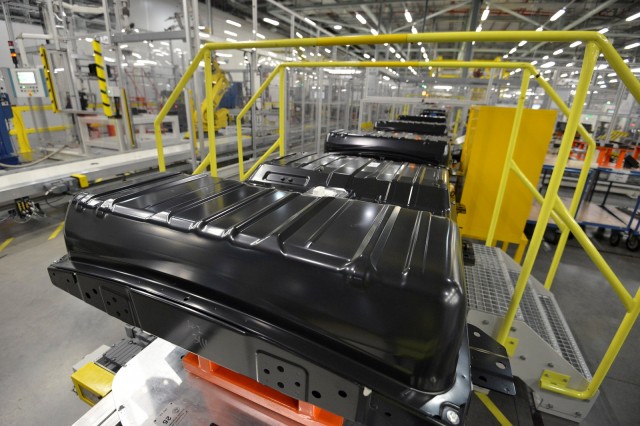
Lithium-ion cell and battery pack assembly for Nissan Leaf electric car in Sunderland, U.K., plant
Facing competition from American scientists, Japanese automakers are teaming up to develop solid-state lithium-ion batteries for electric cars, according to a Nikkei report.
Solid state batteries have been seen by some engineers as the holy grail for cars because they are safer and have higher energy density than today’s lithium-ion batteries. That can give cars more range and allow faster charge times.
Automakers currently build large structures around the batteries to isolate them in case of fire, and big extra cooling systems to maintain safe battery temperatures. Solid state batteries wouldn’t need any of these things, which would help reduce costs.
DON’T MISS: Battery legend Goodenough not done yet: new solid-state chemistry introduced
Toyota, Nissan, and Honda have joined forces with batterymakers Panasonic and GS Yuasa, along with the Japanese Ministry of Economy, Trade, and Industry in a $14 million program to develop solid state batteries.
The consortium has set targets to build batteries with a 340 mile range by 2025 and a 500 mile range by 2030. Toyota said late last year that it will have solid-state batteries ready for production early in the next decade.
So far neither the Japanese consortium nor the University of Texas engineers has demonstrated the ability to scale up production of their solid-state technologies, but Bollore in France has built a fleet of its BlueCars for use in car sharing services in Paris and Indianapolis.
CHECK OUT: Indianapolis Electric-Car Sharing: We Drive BlueIndy’s BlueCar [2014]
One challenge with solid-state batteries is that they don’t produce as much power as batteries with liquid electrolyte, so automakers may need to combine smaller batteries with ultracapacitors that can discharge quickly when the driver boots the accelerator, then replenish that charge more slowly over time.
As an example of how solid-state batteries work, Goodenough’s battery uses a solid glass electrolyte and a lithium-plated sodium anode. which has greater energy density than lithium. The University of Texas claims the battery has three times the energy density of today’s lithium batteries, and can be charged in minutes instead of hours. Researchers also claim their battery can operate efficiently at minus 20 degrees Celsius, making it much more useful in electric cars.
If researchers can develop solid-state lithium batteries that are cheap enough to produce with greater energy density and faster charging than today’s lithium-ion batteries, it could prove a game-changer for electric cars.
